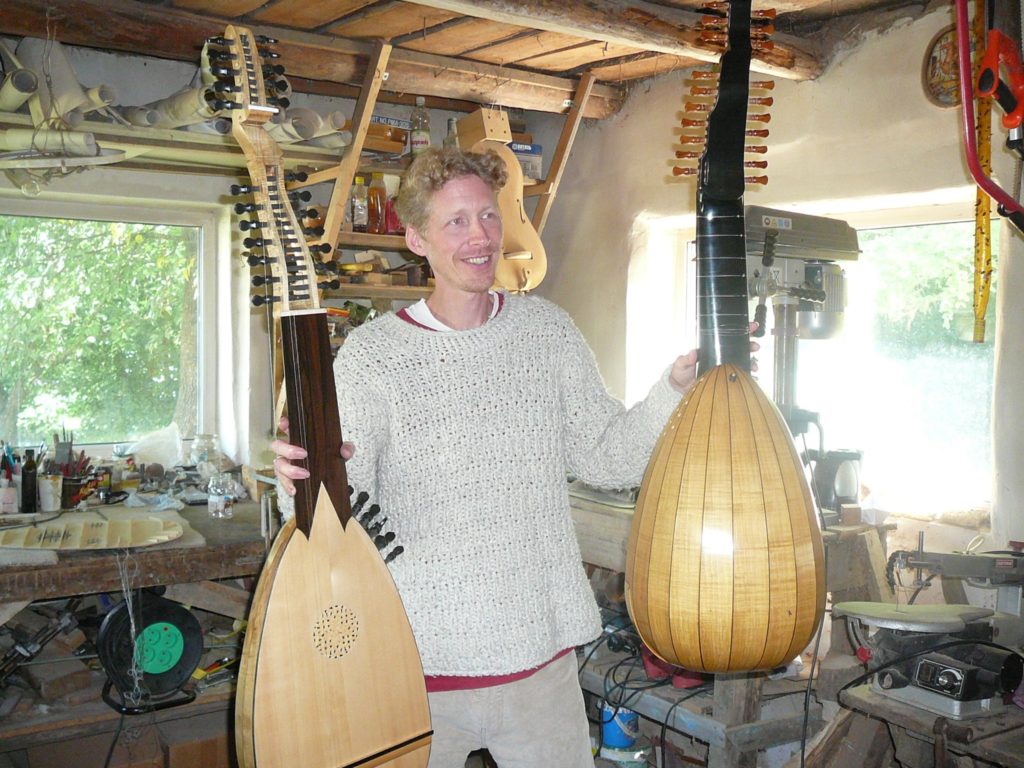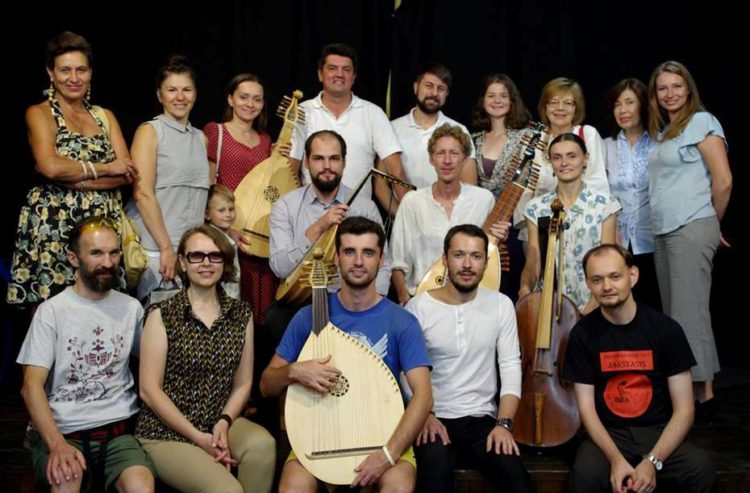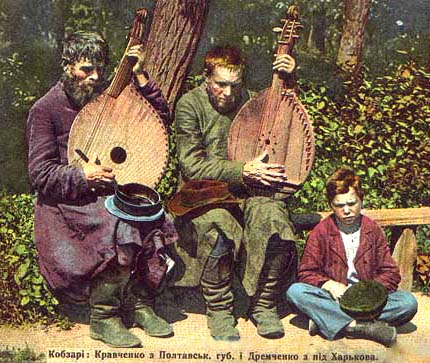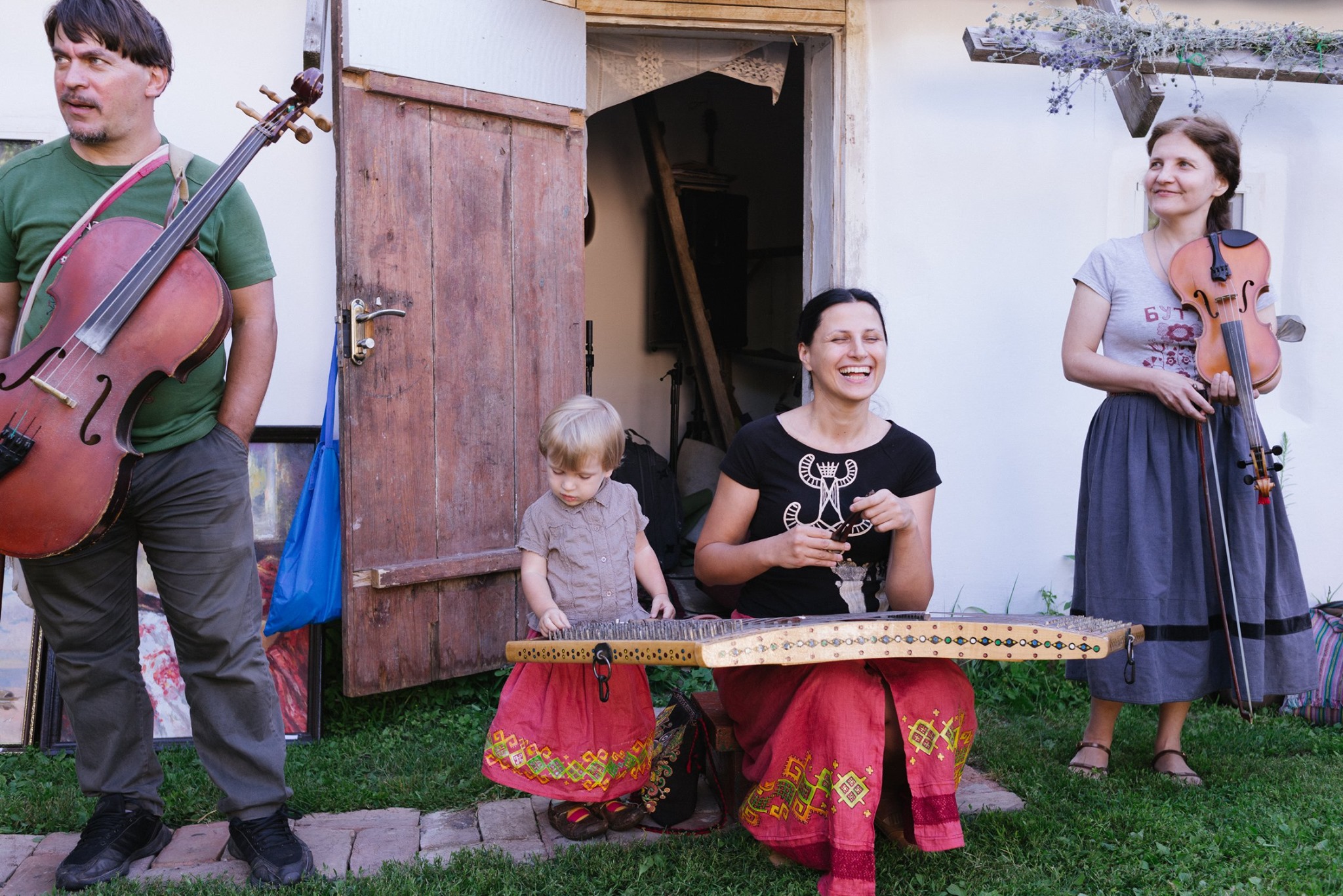Bury me, bury me
Where I can see the wide steppe
And hear the roar of the Dnieper
Meandering through Ukraine
To the blue sea...
“Will and Testament” from Kobzar by Taras Shevchenko written on 25 December 1845 in Pereyaslav, Ukraine, translated by Colette Hartwich
The world knows Taras Shevchenko well. His collection of poems, Kobzar, first published in St. Petersburg in 1840 defined his works and style for the rest of his career. But today, it’s not about Shevchenko’s endless talents. Today, it’s about the Kobzars.
Did you know that to this day the kobzar singers exist? They are not fairytale characters from grandmother’s bedtime stories. Today, they are keepers and cherishers of a once lost Ukrainian tradition and folklore.
I first became aware of Jurij via a coincidence. My daughter’s choir partner, a Ukrainian woman, shared pictures from a ball at my ancestor’s estate in Berezova Rudka. In the center of it all stood Jurij with his musical instrument in hand entertaining the few people that were not afraid of Covid-19 last summer and came out to have, well, a ball. Their happy faces, traditional Ukrainian outfits, and jolly dancing made me smile.
The worldwide pandemic makes us miss cultural performances and celebrations of culture evermore as the pandemic never seems to end.
Kobzar's way home
Jurij is an American who found his roots in Ukraine. His ancestors are Ukrainian and Jurij says he never felt really at home in the United States or really American for that matter. Growing up in a diaspora community in Raleigh, NC, Jurij says he felt like
“the last of the Ukrainian Mohicans. I always considered myself Ukrainian, and always had a longing for Ukraine, although previous to my 23rd year, I’d never been there.”

All it took to discover his home, Ukraine, was jumping on a plane, and “coming home” was “a wonderful feeling,” says Jurij. It is this wonderful feeling of being at home that keeps Jurij in Ukraine
“through the wars, revolutions, economic crises, etc. I don’t like being always from Ukraine for too long, especially because my immediate family is here, but not just. We have a place in the culture here. That place is very special as is the work thereof. I’m very proud to have the chance to live, work, and flourish here.”
Jurij’s ancestors, he says, didn’t have that possibility and, for Jurij, his life in Ukraine is a special certain feeling of compensation for their longing.
Over the course of the past 20 years, Jurij discovered his mission to revive the nearly lost kobzar tradition. Having access to others who are central to this mission such as Julian Kytasty, Victor Mishalow, and Taras Kompanichenko (kobzars of international renown) among others grew Jurij’s interest, and these role models were always nearby.
Over time they became teachers and friends. According to Jurij, the mission of recreating such a time-honored tradition as the kobzardom would be too much work for one person’s shoulders. As a group or a guild, the task at hand becomes easier.
- Read also: Craftsman from Lviv makes hurdy-gurdies
Kobzar guilds

In the history of kobzar tradition, guilds used to play a central role. A guild of kobzar singers was modeled on an artisan guild’s example and protected the interest of the guild’s members. They had their own secrets, rules, and traditions.
Guilds upheld the idea that kobzar singers were not beggars but professional artists and instilled a sense of pride among their members. Jurij is part of the Poltava Kobzar Guild, which he says they formed pretty recently.
Kozak baroque
Jurij specializes in the torban, a Ukrainian musical instrument combining the features of a Baroque lute with those of psaltery, instrument construction, guild development, festival presentations, and touring worldwide.

Before the first lockdown in March of 2020, Jurij was ready to tour Europe for several months. The tour included 45 cities and went from Kyiv to Lisbon and Edinburgh and back.
“The border closed actually the day of my departure, which decided the fate of the tour and It’s been difficult. I spent half the year abroad, touring, before the virus,” says Jurij.
Even though It’s been very difficult for Jurif to stay on his farm the whole year, he made good use of his time at home: a festival in July in Berezova Rudka, a finished children’s room, which took about six months to build, a six-month course of building musical instruments with two students, American and Canadian, and a three-month-long camp on top of that.
Jurij and the guild even attempted arranging a tour of Ukraine and he says it was as successful as his other accomplishments in the pandemic year. For Jurij the lockdown has proven to be a blessing in disguise it seems, even if there are existing financial worries as the guild has used to living off of the funds from “kobzaring.” But due to the lockdown, they had even time to develop a new musical project that deals with “noble repertoire” - music of European and Ukrainian Renaissance and Baroque. Lockdown grounded the musicians and everyone had time to rehearse and record new music.
For Jurij, the “noble repertoire” is the “Kozak Baroque,” roughly music from the 17th and 18th centuries.
“I use the term Baroque to refer not to the folk music of the time, but to the music of the noble and educated classes which was under the influence of European genres and forms. Presently the public is unaware of such music, especially in Ukraine. This is very unfortunate, as the music of the Kozak Baroque contains texts of noble character and message, as well as music of an educated and refined nation,” says Jurij.
According to him, “the spirit of 'Kozak Baroque' is a spirit lacking in Ukraine today and a spirit needed to educate the new generation of Ukrainians,” who, according to Jurij today still prefer listening and championing Moscowian jailbird chansons and Soviet pseudo-folk music.
I agree with Jurij here. An emphasis on historical and cultural education should be put in the educational programs of today’s youth. History and culture are among the few ways to interest youth to participate in society well. It is worth noting, that the kobzar tradition was completely destroyed by 1933, through mass executions and starvation.
Declining tradition
The decline of this tradition was gradual as conditions worsened and repressions from the Russian Empire (and later the Soviet Union) intensified with time. Kobzars were beaten and their instruments destroyed. It all came to a standstill in 1933. It was, in the end, Stalin who called on the nation's kobzar to come together for a conference. Stalin then had them executed. Soviet forms of popular music took over and authentic folk music lost its popularity.
Today, for Jurij is important to save what’s left before it disappears forever. Ethnomusicologists, as someone who researches or propagates folk music (or both in Jurij’s case) are very important, just as collecting folk music and its traditions from villages in Ukraine.
Jurij tries to cooperate with as many museums as possible: those of history, music, and ethnography in particular, but he’s not excluding any museum from possible collaborators. For Jurij, museums are key centers of the culture of Ukraine.
“We do our best to support them, giving concerts and other programs, allowing the public to frequent their local museums… Museums are also a source for our search of the past, especially instrument collections, which help us create new instruments, from old examples,” Jurij tells me.

Presently, Jurij is working on a photo archive of all torbans, kobzas, and banduras from around the world. Touring allows Jurij to travel all around and collect photographs and technical drawings.
Jurij feels that people outside Ukraine are wonderfully supportive and enthusiastic. Jurij and his band’s tours are conducted completely through volunteerism, though it’s rare for a group to make it abroad or arrange an event through the diaspora or foreign organizations. Barriers like border crossings, language, lack of funding, transportation, and living arrangements among others stand in the way of touring most of the time.
But “once someone does make it out of Ukraine, the cultural exchange can be significant,” says Jurij, “There are regions of the world where no Ukrainian musicians are frequent. Those places can be the most interesting and rewarding,” though Jurij doesn't specify what regions he has in mind. It could be a professional secret.
For him, the creation of a contemporary international Kobzar network is fascinating,
“My program is not just presenting the lost tradition, but the realization, resurrection, and continuation of that mission… We can travel anywhere. The main question is how it’s all possible. I have two answers, Facebook and providence. It’s really not such a possibility for any Ukrainian musician, although I encourage all my friends here to give it a try. But I imagine this unique possibility might be specifically for the modern Kobzar mission.”
In the times of the world shrinking possibilities and chances are up for grabs indeed. Facebook allows people to connect to the farthest corners in the world, and I'm sure Jurij’s Kobzar network is thriving, and his Facebook pages are proof of that.
Kobzar camp
Among Jurij’s tools for the revival of kobzar tradition are camps and festivals. The camp “Kobzarskiy Tabir” is designed to make it easier for newcomers to join the tradition. The problems of obtaining or making a musical instrument are imaginable and the camp helps to solve them.

According to Jurij the first step to revive the kobzar tradition is to make an instrument. “Kobzarskiy Tabir” offers free education, materials, and lodging, and many students travel from abroad to enjoy the camp. Over the years the camp became one of the most important tools to the revival movement.
“When I see students kobzaring around the world, I realize that this is necessary and blessed. I really have a wonderful time working with students,” says Jurij.
He believes, the “Kobzarskyi Tabir” paved the way for the creation of “Poltava Kobzar Guild.” It takes between two and three months to make a kobza or bandura, a torban - Jurij’s musical instrument - takes four months.
“Experience has shown that only serious folks come to study and make and I haven’t had any problems with most of my students. We accept folks of all faiths as potential students and guild members. It’s very important for students to be ‘ready’ for undertaking such a mission,” says Jurij.
For him, the kobzar tradition is a spiritual one. A spiritual or religious experience is not required although they prefer well-educated and morally strong students.
“We’ve been blessed with a steady flow of students. Unfortunately, we’ve had no students from the villages in the Poltava region, hopefully that will change,” Jurij says. Most students come from Kyiv, Poltava, Kharkiv, Lviv, and from abroad and know what they are signing up for.
Festival
Each year in the village of Kryachkivka, or as Jurij calls it “the kobzar heartland, the Poltavian village” Jurij and his guild organize a festival. During the festival, the kobzar tradition is presented in the context of similar musical or folkloric traditions to the public, the visitors, and fans. The villagers themselves mostly try not to notice the festival, though there are those who participate.
Jurij is sure that “we do make a significant impression on their world.” According to Jurij, it could seem bizarre to the people of Kryachkivka to see “some ‘foreigner’ coming to town, preaching the revival of their lost traditions” which have been long forgotten, “especially since the present traditions are mostly Soviet ones… folks here are afraid, they are used to living in a cultural vacuum created by an oppressive regime.”
The festival welcomes anyone and everyone willing to participate, and Jurij has a lot of patience with the villagers themselves and is happy seeing the village folk participating in the festivities.
For the festival, there is a line-up of the musicians and other creatives Jurij invites to participate each year. Jurij simply invites those who he thinks should be at the festival and “there are lots of interesting folks in the underground folk movement, most are relatively unknown.”
A tradition has been created over the years where really anyone can show up with an instrument (or without) and take part.
“Last year, several very high profile musicians appeared without invitation. It was wonderful,” Jurij recounts.
It can be called a festival which runs itself. There is an evening stage (evening means after dinner) with microphones and other accessories for performing, but only for several hours. The sound is not amplified and that allows for many events to happen at once, without dissonance.
“In a quiet village, you need no microphones. Everything is audible and crystal clear,” says Jurij.
These annual festivals champion folk music, mostly. According to Jurij, for the festival to be successful each participant must feel the possibility to sing, dance, create, and express themselves. It’s almost as if the yearly festival has always been a festival for the musicians and creatives themselves, rather than a presentation.
It’s a unique alternative format and “the results have been wonderful over the seven years the festival has existed,” mentions Jurij.
Folk music philosophy, present at the festival, is contrary to what we understand as music or festival. Here the association with the elevated stage, the singer with a microphone, the genius artist in front of a crowd of silent, voiceless observers disappears. Jurij says that they organize the festival a month in advance, at most.
This year they are trying to invest more time into the organizational part.
“We have simply the matter of programming such individuals [underground folk musicians who Jurij thinks should be at the festival] in a single event. The results are incredible,” Jurij tells me.
The main issue of the festival is the lack of funds. But somehow “each year the funds ‘appear’, recently people have started to donate.” Jurij thanks God for taking care of him, the guild, and the festival.
“Last year a group of tourists arrived several days before the festival and left 200$ for the tour of the workshop and collection. This never happens in Ukraine, but it happened last year,” tells me Jurij. “God takes care of us, and knows how to fund our projects. I think it’s not so difficult for him.”
Ukrainer.net's 2017 video about Jurij Fedynskij (English subtitles are available).
In case you are having issues imagining what Kobzar traditions, musically, are, Jurij gives me an introduction to examples of modern music that draw inspiration from the musical traditions of kobzars. He says,
Jurij himself practices modern rock’n’roll and teaches villagers this modern genre, those “who are not interested in folklore. Rock is accessible for Ukraine’s youth.”
Finally, Jurij tells me he has visited Berlin with their group “Krachkyvka” before. Maria and Oleksiy Ustenko, where “Krachkyvka” performed at “Odesa Mama,” a restaurant in the South-Western part of Berlin, and Jurij says it was wonderful. And now I feel sorry I missed it.
“I had planned a Kobzar visit to Berlin just before the quarantine,” adds Jurij, but I guess we’ll have to wait until the world is back to some sort of normality. But in Berlin, Jurij is always welcome and I’d be happy to finally observe and maybe even participate in festivities in the future. Thank you Jurij for not letting traditions disappear and spreading the joy of Kobzar.

Read more:
- The destruction of Ukraine’s folk singers
- Craftsman from Lviv makes hurdy-gurdies
- Polyphony Project: discovering the largest online archive of traditional Ukrainian songs
- Explore Ukrainian traditional culture with interactive site “Authentic Ukraine”
- A Ukrainian composer’s gift to the world of Christmas music
- Phone app brings 40 Ukrainian classical composers into your pocket
- Bondi Vesolovsky and Yabtso Jazz: swinging Lviv in the 1920s-30s
- Modernized past: how today’s Ukrainian culture combines tradition and modernity
- On the ancient pillars of Ukrainian democracy: Pylyp Orlyk’s Constitution of 1710
- Memory wars and other battles
- Ukraine’s open colonial wounds
- The Man and the Nation nobody expected: Andrei Sheptytskyi and Ukraine






